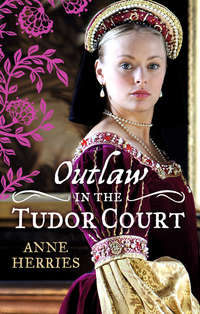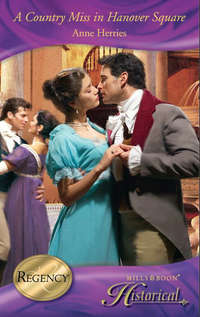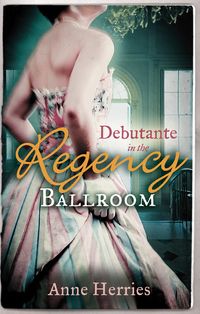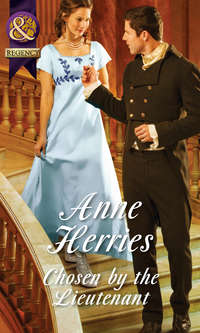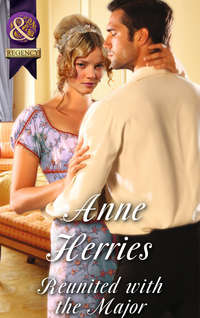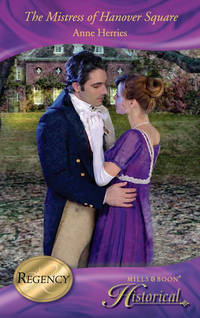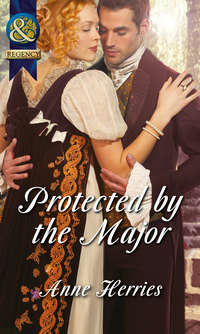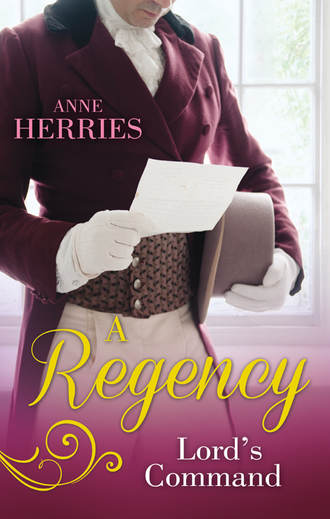
Полная версия
A Regency Lord's Command: The Disappearing Duchess / The Mysterious Lord Marlowe

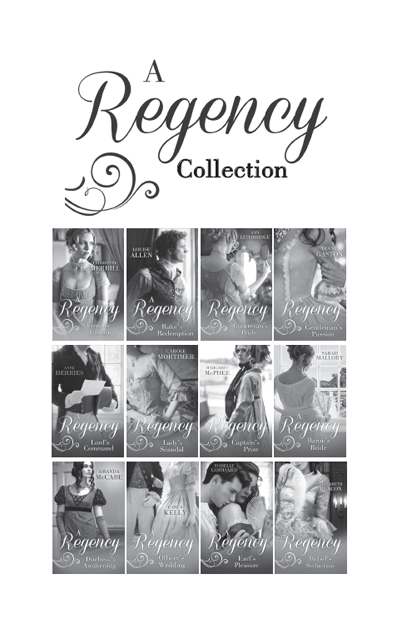
ANNE HERRIES lives in Cambridgeshire, where she is fond of watching wildlife and spoils the birds and squirrels that are frequent visitors to her garden. Anne loves to write about the beauty of nature and sometimes puts a little into her books, although they are mostly about love and romance. She writes for her own enjoyment and to give pleasure to her readers. Anne is a winner of the Romantic Novelists’ Association Romance Prize. She invites readers to contact her on her website: www.lindasole.co.uk.
A Regency Lord’s Command
The Disappearing Duchess
The Mysterious Lord Marlowe
Anne Herries

Table of Contents
Cover
About the Author
Title Page
The Disappearing Duchess
Prologue
Chapter One
Chapter Two
Chapter Three
Chapter Four
Chapter Five
Chapter Six
Chapter Seven
Chapter Eight
Chapter Nine
Chapter Ten
Chapter Eleven
Epilogue
The Mysterious Lord Marlowe
Prologue
Chapter One
Chapter Two
Chapter Three
Chapter Four
Chapter Five
Chapter Six
Chapter Seven
Chapter Eight
Chapter Nine
Chapter Ten
Chapter Eleven
Chapter Twelve
Afterword
Copyright
The Disappearing Duchess
Anne Herries
Prologue
Justin, Duke of Avonlea, looked round at the sea of faces. They were all staring at him expectantly, believing that he was about to make a speech of welcome and cut the cake with his bride. His mouth was dry, his chest tight with a kind of suspended agony, as he struggled to come to terms with what was seemingly going on.
Lucinda, his beautiful bride, had gone. She had left him almost immediately after the wedding ceremony. They’d returned from the church together in the carriage to his beautiful home, where the lavish reception was being held. She’d excused herself to him, saying that the flounce on her wedding gown was torn.
‘I shall be no more than ten minutes, Avonlea,’ she’d said with that shy smile he found so attractive. ‘Please make my excuses to our guests. I shall join you as soon as I can.’
‘Of course, my love.’ He’d taken her hand to kiss the palm. ‘You look beautiful, Lucinda. Have I told you how much I adore you?’
‘Yes, Justin, several times. I am very fond of you, too,’ she’d said, smiled and left him to run lightly up the stairs.
That was more than an hour ago and since then no one had seen anything of her. Concerned after thirty minutes or so that she was keeping their guests waiting unduly, he’d gone up to her rooms to ask what was causing the delay. He had found only her maid, Alice.
‘Where is your mistress?’ he asked. ‘We must not keep the guests waiting any longer.’
‘I have not seen Lady Avonlea since you left the church, your Grace.’
‘But she came directly up to have the flounce mended on her wedding gown. How can you not have seen her?’
‘I have been waiting for her,’ the maid said and looked nervous. ‘Truly, she has not been here, sir.’
‘Lucinda told me her gown was torn…’ He looked around the room, which had been recently refurbished in the colours his young wife loved: creams, various shades of rose and gold, blending perfectly. No expense had been spared and he had imagined her being happy in the luxury he had provided. ‘Is there no sign of her gown? Did she change into something else?’
The maid could not meet his eyes as she shook her head. ‘Forgive me, sir. I was gone but a few moments and only to make sure that my lady’s bags were safely stowed ready for your journey. When I returned I thought a few small things might have disappeared, but I was not certain.’
Avonlea strode over to the armoire and opened it, but the shelves were full of the gowns and beautiful silks he had purchased for his bride’s pleasure.
‘I cannot see that anything has been taken.’ He frowned at the maid, feeling stunned. How could his bride have disappeared from her home on her wedding day, and more importantly, why? ‘Make up your mind, girl—this is important. Surely your mistress would not leave without taking anything—or leaving a message?’
‘There was an old gown—and some trinkets that my lady valued, which have gone from the dressing chest, but all her good jewels are here, your Grace.’
‘Your mistress must be in the house or gardens,’ Justin said, refusing to believe that what the maid was implying could be right. Why on earth would Lucinda leave him? He could think of no possible reason for they had been on good terms; there had been no quarrel, no dispute between them. The marriage might not have been a love match, but there was respect and affection on both sides—at least he had believed so when Lucinda accepted his suit. What could have changed her? What had he done that she must flee from him without a word?
He took a turn about the room, trying to find an answer to his questions; discovering no clue, he turned back to the anxious maid.
‘Search your mistress’s room thoroughly and make certain whether there is a letter left somewhere. Also, please make a list of what has been taken. I need to know whether this was planned or an impulse. In the meantime, I shall have a search made for her.’
The search had begun, but as yet no sign of the new duchess had been found and no one seemed to have seen her.
The guests were getting restless, beginning to gossip amongst themselves. Justin could see concern, intrigue and some exchanged knowing looks; his true friends would be anxious, but some of his slight acquaintances might be amused if they learned that his bride had left him—not at the altar, it was true—but before the wedding reception had been held. It was a lowering thought and one that hurt his pride. Accustomed to homage, and with his good looks and vast wealth, sought after by every matchmaking mama in England, he had thought long and hard before asking a lady to be his wife. Lucinda might be a virtual nobody from the country, but her modesty and shy smile had convinced him that she would be the perfect wife for a man in his position.
Since childhood Justin had been taught his duty. He was born to a family of impeccable lineage and respectability. There were no skeletons to hide in his family closet, no scandals or acts of dishonour.
‘Always remember your honour,’ his father had told him as a young lad. ‘No matter how much it hurts, no matter how hard, you must always do your duty, Justin. A gentleman’s honour and his family name come first. Promise me you will never forget, my son.’
Justin promised. His first offer of marriage to a lady of whom he knew his father to approve had been refused; slighted, it had taken Justin a long time to select another lady. He had believed Lucinda perfect in every way—and now she had run away, making a fool of him before his friends on his wedding day, hurting him in a way he would not have imagined possible until this moment. Looking round the room, he drew a deep breath, squashing the anger and disappointment that raged inside him.
‘Forgive me,’ he announced and the voices were silenced, faces inquisitive, eager for news. ‘I am distressed to tell you that my wife has been taken ill. She will not be able to attend the reception. Please, enjoy the food and wine provided. I want to thank you all for coming and beg you to excuse me.’
He saw from their faces that they guessed he was lying. They had sensed something was wrong. He cared not to speculate on what they imagined was going on, but nothing could be stranger than the truth.
Chapter One
‘You have no idea where Lucinda went or why?’ His good friend and neighbour Andrew, Lord Lanchester, looked at him thoughtfully.
‘I’ve had no word from her in almost two months,’ Justin replied morosely.
Andrew had just returned from a tour of duty as the Duke of Wellington’s aide in Spain. Wounded at Salamanca, he was now recovered, with only a slight limp to show for his suffering.
‘I’ve searched everywhere. I’ve spent weeks looking for her, but although one or two of the tenants think they may have seen her walking near the estate on the day of her disappearance no one knows where she has gone.’
‘What else have you done?’ Andrew frowned. ‘Have you employed an agent to trace her? Offered a reward for any information regarding her whereabouts?’
‘I have thought about employing an agent secretly. I did not wish to offer a reward, because it would cause such a scandal. If—when—Lucinda returns, I do not want vicious tongues to destroy her.’
‘You cannot hope to keep this brushed under the carpet?’ Andrew raised his eyebrows. ‘My sister Jane was here for the wedding and she told me as soon as I returned home from Spain that she felt something was amiss. She is not a gossip, but she was fond of Lucinda and is naturally worried about her, especially since she’s heard no word since that day. The tale of Lucinda’s disappearance has got about and people will talk, however discreet you are.’
‘Your sister has been both considerate and kind,’ Justin said, turning to look at his long-time friend and close neighbour. ‘I know that she is Lucinda’s good friend and I have been able to voice some of my concerns to her. However, she has no idea of what might have caused Lucinda to run away.’
‘Are you certain she has run away?’ Andrew asked gently. ‘Couldn’t there be another reason for her disappearance?’
Justin ran his fingers through his thick hair. There were dark circles beneath his eyes, proof of his sleepless nights, and a new harshness about his mouth. He seemed not to hear his friend. ‘What made her do it? I have racked my brains to try to think if I did or said something that distressed or frightened her. If she did not wish to be my wife, she could have sent me a note before the wedding to break it off. Why marry me and then leave without a word? Surely I am not such a monster that she feared me?’
‘I have no answers for you,’ Andrew said. ‘Had I been at home I should have advised employing an agent immediately, as it all sounds very suspicious to me. You are certain there was no letter? She left no word for you?’
‘Her maid had not seen her and there was nothing that either of us could find anywhere.’
‘Why not search her room again? Something may have been missed. I remember meeting Lucinda once when she and Jane were at the Raddlit Academy for young ladies. She did not strike me as the type of girl to behave badly. Jane liked her a great deal and my sister is usually a fine judge of character.’
‘Lucinda is the sweetest creature I have ever met,’ Justin said and the look he gave Andrew was one of despair. ‘I cannot believe she would hurt me like this—yet perhaps you are right, maybe there is more to this story than meets the eye.’
‘If you will permit me, I shall find an agent for you. I think we should give him Lucinda’s maiden name. She will hardly be using yours, Avonlea.’
‘Lucinda Seymour,’ Justin said. ‘She was such a quiet girl, but her smile attracted me from the beginning. When her aunt brought her to Harrogate I knew she was the one I wanted as my wife from the first moment I saw her—but she resisted me. She was polite but reserved, keeping me at a distance. It was not until she came to stay with Jane and we met again at your home that she let down her guard enough for me to have hope.’ His eyes reflected his anguish. ‘She told me she was very fond of me just before we parted. Why did she say that and then leave me? What could she hope to gain?’
‘My guess is that there is some mystery here,’ Andrew said. ‘I cannot solve it, but I am certain that when Lucinda is ready she will return and explain everything.’
‘If she cared for me even a little, she could have told me what distressed her so very much.’
‘Forgive me, Avonlea—are you in love with her?’
‘Naturally, I care for her…but I am not certain I know what love is in the sense you mean—there was precious little of it in our house when I was a lad.’
‘Then it was not a love match.’ Andrew looked thoughtful. ‘Perhaps she felt that you might wish her gone if you knew the truth about her.’
Avonlea stiffened. ‘What do you mean, pray?’
‘How well did you know her? Was there some secret in her past, perhaps?’
‘Nothing that she could not tell me. I would have listened and helped her if I could.’ Justin frowned. ‘Do you know of something?’
Andrew hesitated, then, ‘I remember she left school quite suddenly and Jane did not hear from her for some years. She was very distressed about it at the time.’
‘You do not know why she left?’
‘I have no idea. Of course, it may have no bearing on this matter.’
‘I do not see how it could.’
‘Then perhaps she will return when she is ready.’
‘I pray that you are right. I fear for her. I think she has very little money with her. I gave her some guineas for use while we travelled, but it was hardly enough to live on for the past two months, though she may have some jewels and a little money of her own, I suppose.’
Justin’s mind was torn between distress, anger and bewilderment. He had searched every day for the past few weeks, but there was no sign of his duchess. In his heart he had begun to think that she might be dead—why else had she not told him where she was or why she had gone? Had someone abducted her—or, worse, murdered her to be revenged on him? He could not think of anyone who hated him that much—but why else would she have been taken?
‘So, you would take her back—no matter the reasons for her disappearance?’
‘She is my wife,’ Justin said and looked at his friend, as if surprised at the question. He was a gentleman and a man of honour—what else could he do but take his wife back if she came to him in trouble? ‘I’ve been in hell these past weeks. Besides, it is my duty to care for her. If she is in distress, I shall help her, no matter what. I should thank God for her safe return and pray that I could make her happy.’
‘Then I shall go to London in the morning and employ an agent for you,’ Andrew said. He reached out to lay a hand on Justin’s shoulder. ‘Do not give up hope yet, my friend.’
Lucinda looked around the small kitchen and sighed. She had scrubbed the floor that morning before it was light; it was much cleaner than it had been when she first arrived, but nothing would make this hovel the kind of home in which she could bear to live. However, it was all she could afford, because she had spent the guineas her husband had given her as pin money.
If she had not run away, she might have been at Avonlea now. Lucinda felt her throat catch and a tear slid down her cheek. She brushed it away impatiently. Her husband must be so angry with her. When she’d discovered the blackmail letter lying on her dressing chest on her return from the church, she had fled in panic, taking only a few things rolled into a paisley shawl. How could anyone know her secret? It was more than five years since that terrible time when the shame had come upon her.
Her first thought had been for her husband’s good name. Avonlea was such a well-respected man and the realisation that she had brought a stain of dishonour to that proud family had almost overpowered her. She knew that he had married her because he’d believed her a girl of blameless past, modest, her reputation beyond reproach.
How she had deceived him! What a wicked thing she had done by marrying him without confessing the truth. She ought to have been resolute in refusing his obliging offer; at first, she had managed to keep a distance between them, but, as she became more attracted to him, she had found it too hard to resist the prompting of her heart. In the end she had fallen so desperately in love that she could no longer refuse Avonlea—yet she sensed he did not love her as she loved him. He spoke easily of love, but she thought it merely liking: the kind of feeling that might grow to warm affection with the years and the coming of children—but the spiteful letter would destroy his respect for her. He would hate her, wish to be free of the burden she must become to him when he learned the terrible truth.
Lucinda closed her eyes and sat down in the rocking chair by the kitchen fire, trying to control her thoughts. She had tried to block out the memory of that evil night when as a young girl she had been raped in her own room by a man she had thought her father’s trusted friend.
Warned that unless she kept silent her father would be ruined, Lucinda had said nothing until her condition had become noticed. It was a terrible misfortune that she had fallen with child so easily. When she tried to explain that she had been raped, but would not give the name of her seducer, her father had refused to listen. He had banished her to live with her strict grandmother in seclusion; when her child was stillborn, she had remained in seclusion until her father died. It was her punishment and he would not allow her to return home. Her mother had relented after her father’s death and allowed her to visit Harrogate with an aunt. It was there she had met Avonlea and begun to fall in love. She had kept her distance, because her shame was so terrible that no decent man would wish to marry her if he guessed that she had borne an illegitimate child.
‘Your father told you that you had forfeited the right to happiness,’ Mrs Seymour had told her when she mentioned the duke’s attentions. ‘I do not wish to deny you all the pleasures of life, Lucinda, but you must surely see that you can never marry?’
Because of her late father’s strictures and her mother’s doubts, Lucinda had kept Avonlea at a distance in Harrogate, but then, when they met again at the home of her great friend Jane Lanchester, she had taken the bold step of confiding in Jane, who had advised her that she must follow her heart and marry him.
Lucinda sighed as she looked around the cottage. It had hurt her so very much these past weeks to stay away from Avonlea, but the blackmail letter had told her something she had needed to confirm. Now she knew the truth and she was going to do something so daring that it frightened her.
She had fled from Avonlea in panic, not knowing what she meant to do, conscious only that she was not ready to confess the truth to a husband who had married her believing her beyond reproach.
In a state of absolute shock, she’d hardly known what to believe. Not only had the blackmailer known all of her intimate secrets, but also surprised her with the revelation that her infant hadn’t perished at birth, but was in fact even this day alive.
The blackmailer had threatened to reveal her shameful secret to the world unless she paid ten thousand pounds, but he or she had also offered to tell her where her child was living—in poverty and danger, the note had said, the words sending icy shivers down her spine.
At first resentful of the babe growing inside her, during the months of her confinement Lucinda had grown to love the idea of a child coming to life within her womb. Rejected by her family, with no one to love or care for her, she had talked to the babe, believing that when the child was born she would no longer be alone, but then after hours of pain and suffering she’d been coldly informed that the babe was dead. Lucinda had grieved for the child, but come to terms with her grief, banishing all the tainted memories to a tiny corner of her mind. She had told herself that the past no longer mattered to her—and then, suddenly, on the morning of her wedding to the duke, to learn that her child was alive!
Her mother had lied to her. The distress of learning the extent of her parent’s cruelty had completely overset her. Instead of going to Avonlea and throwing herself on his mercy, as she might had she been certain of his feelings, she had thought only to run away. Better that she simply disappear than bring shame to him.
At first the shock had been so great that Lucinda could hardly take it in; then, seized by sudden panic and the need to know the truth, she’d taken an old gown and some trinkets and fled through the gardens. In confusion, with only a vague idea of what she meant to do, she set out for her family home. She was weeping, in terrible confusion and pain as she fled, unable to think coherently. It was only in the long lonely days and nights that followed that she’d begun to think about what she was doing—to discover her feelings about the child she’d believed dead.
Lucinda had arrived at her mother’s home some ten days later, having begged lifts for some of the journey, but walking much of it. After first making her escape, she’d changed into her old gown. She’d hidden her beautiful silk wedding gown behind some hay bales in a barn at the edge of the Avonlea estate; carrying only a small bundle, she had continued her journey wearing a plain grey gown more suited to a governess than the duchess she’d become. No one had given her so much as a second glance. When she finally arrived home, her mother had greeted her with a sour look. Mrs Seymour had refused to attend her daughter’s wedding on the grounds of ill health, though her true reason was that she did not approve of Lucinda marrying anyone.
‘So you’ve come to your senses. It was a stupid thing to do, Lucinda. I suppose he threw you out?’
‘Avonlea knows nothing,’ Lucinda replied. Shaking with anger, she had thrust the letter under her mother’s nose. ‘Where is she, Mama? Where is my daughter? The child you stole from me—the child you told me was dead?’
Her mother’s face had turned pale. At first she had continued to refute her daughter’s accusation. For ten days she had tried to deny all knowledge of the child, swearing it had died at birth and that she knew nothing. Lucinda had questioned her relentlessly, never giving her a moment’s peace, and in the end she’d broken down in tears.
‘Your father would not let you keep the babe. He took it to a workhouse and…I believe she was adopted by a childless couple.’
‘Tell me their names, Mama.’
Mrs Seymour shook her head. ‘I know no more. I swear he told me nothing.’
‘Very well, give me the name of the workhouse.’
‘It will do little good after all this time.’
‘Tell me what I wish to know and I shall leave you in peace. Deny me and I shall continue to question and demand. I am no longer the frightened child I was when I was so cruelly abandoned by you.’
‘It was not my wish—but your shame had to be hidden.’
‘Why? Had you loved me as a mother should, you could have taken me away, perhaps abroad, and let me keep my babe. We might have found an honest living somehow.’
‘Why do you care about the child if you were raped, as you claim?’
‘How could you doubt me?’ Lucinda looked at her sadly. ‘The man who used me so cruelly was a monster and if my father had stood by me, he might have been punished—but Papa preferred to believe his friend’s lies. He, I hate—but my child is innocent. Mama, can you not see that I need to see my child? The knowledge that she lives is tearing at my heart. I shall never be at peace until I know how she is.’


